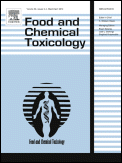
FOOD AND CHEMICAL TOXICOLOGY
Scope & Guideline
Unveiling the science behind food safety and chemical exposure.
Introduction
Aims and Scopes
- Toxicological Mechanisms:
The journal publishes research that investigates the mechanisms through which various substances, including food contaminants and additives, exert toxic effects on biological systems. This includes studies on oxidative stress, inflammation, and cellular apoptosis. - Risk Assessment and Safety Evaluation:
A core focus is the assessment of health risks associated with exposure to chemicals and toxins in food. This includes both qualitative and quantitative risk assessments, often utilizing probabilistic models to evaluate exposure levels and potential health outcomes. - Innovative Methodologies:
The journal encourages the use of innovative methodologies such as computational toxicology, 'omics' technologies, and advanced statistical techniques to enhance the understanding of toxicological effects and improve safety assessments. - Environmental and Dietary Exposures:
Research exploring the impact of environmental toxins and dietary exposures on human health, including studies on heavy metals, pesticides, and mycotoxins, is a significant aspect of the journal's scope. - Biochemical and Molecular Studies:
The journal features studies that delve into the biochemical and molecular alterations caused by toxic substances, including investigations on gene expression, metabolic pathways, and cellular signaling involved in toxicity.
Trending and Emerging
- Nanotechnology in Toxicology:
There is an increasing focus on the toxicological implications of nanomaterials and nanoparticles, particularly regarding their safety in food applications and environmental impacts. Studies are exploring the interactions of nanoparticles with biological systems and their potential health risks. - Endocrine Disruption and Hormonal Effects:
Research examining endocrine-disrupting chemicals (EDCs) and their effects on hormonal pathways is gaining traction. This includes studies on how EDCs impact reproductive health, developmental processes, and metabolic functions. - Food Additives and Contaminants:
Emerging themes include the safety assessments of food additives and contaminants, particularly in light of new regulatory frameworks and consumer awareness. Research is increasingly focusing on the health impacts of common food additives and the need for comprehensive risk assessments. - Microbiome Interactions:
The role of the gut microbiome in mediating the effects of dietary toxins and the implications for human health is an emerging area of interest. Research is exploring how dietary exposures influence microbiome composition and function, and how these changes may affect toxicity. - Machine Learning and Predictive Toxicology:
There is a growing trend towards utilizing machine learning and artificial intelligence in predictive toxicology to assess chemical risks. This includes developing algorithms for predicting toxicity based on chemical structures and biological data.
Declining or Waning
- Traditional Toxicology Studies:
There is a noticeable decline in the publication of studies focusing solely on traditional toxicology assessments without integrating modern techniques such as computational modeling or omics approaches. The journal is increasingly favoring innovative methodologies. - General Food Safety Assessments:
Research that provides broad, non-specific food safety assessments is becoming less frequent. There is a shift towards more targeted studies focusing on specific contaminants or health impacts, suggesting a move away from generalized approaches. - Single Substance Studies:
The prevalence of studies examining the toxicity of single substances without considering their interactions with other chemicals or within complex food matrices appears to be decreasing. This reflects a growing recognition of the importance of cumulative and synergistic effects in toxicology.
Similar Journals

Mycotoxin Research
Unraveling the Mysteries of MycotoxinsMycotoxin Research, published by Springer Heidelberg, is a vital interdisciplinary journal dedicated to the exploration and study of mycotoxins, their impacts on health and environment, as well as strategies for mitigation. With a solid presence in the fields of Biotechnology, Microbiology, and Toxicology, it has earned a respectable Q3 ranking and continues to facilitate the dissemination of impactful research from 1985 through to 2024. The journal caters to a diverse audience, including researchers, professionals, and students, providing a platform for original research articles, reviews, and case studies that contribute to the understanding and management of mycotoxins. Although it does not offer open-access options, the journal remains a critical resource, engaging its readers with cutting-edge findings and advancements that shape the future of health and safety regarding mycotoxin exposure. With Scopus rankings reflecting its relevance—44th in Toxicology, 113th in Biotechnology, and 71st in Microbiology—Mycotoxin Research stands as an essential publication for anyone dedicated to advancing knowledge in these critical scientific domains.
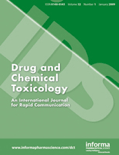
DRUG AND CHEMICAL TOXICOLOGY
Bridging disciplines for safer environments.Drug and Chemical Toxicology is a well-respected journal in the fields of toxicology, pharmacology, and public health, published by Taylor & Francis Ltd. Since its inception in 1978, this journal has diligently explored the effects and mechanisms of chemical exposures on health and the environment, fulfilling a crucial role in advancing scientific understanding and safeguarding public health. The journal is indexed across prestigious databases and features an impressive array of articles categorized within the Q2 and Q3 quartiles across various categories in 2023, reflecting its significance in Chemical Health and Safety as well as Environmental and Occupational Health disciplines. With an extensive reach and a focus on interdisciplinary research, Drug and Chemical Toxicology offers a rich repository of original research, reviews, and methodological advancements, catering to a diverse audience of researchers, professionals, and students dedicated to the betterment of safety and health standards. Although not an open-access publication, its articles are widely accessible to the academic community, ensuring that critical innovations and insights are shared for the greater good.
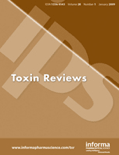
Toxin Reviews
Bridging Research and Real-World SolutionsToxin Reviews is a premier academic journal focused on the critical field of Toxicology, published by Taylor & Francis Inc. Established with an aim to foster research and disseminate knowledge, this journal has been pivotal since its inception in 1982 and continues to be a leading platform for both emerging and established researchers. With an impressive impact factor and ranked in the 75th percentile among its peers in the Scopus categories, it serves as an essential resource for scientists, practitioners, and students interested in understanding the complexities of toxins and their effects on health. The journal provides an Open Access platform, enhancing visibility and accessibility of research findings to a broader audience. Covering a wide scope, Toxin Reviews plays a vital role in bridging gaps between toxicological research and practical applications, ensuring that rigorous scientific inquiry translates into real-world solutions.
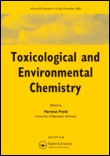
TOXICOLOGICAL AND ENVIRONMENTAL CHEMISTRY
Championing interdisciplinary dialogue for environmental health.TOXICOLOGICAL AND ENVIRONMENTAL CHEMISTRY is a pivotal journal published by Taylor & Francis Ltd, addressing critical intersections between environmental chemistry and toxicology since its inception in 1979. With its ISSN 0277-2248 and E-ISSN 1029-0486, the journal serves as a platform for rigorous research and innovative methodologies in pollution control, health implications of environmental chemicals, and the broader spectrum of toxicological studies. Although it currently does not offer open access, the journal's impact in the field is underscored by its Category Quartiles rankings in 2023, placing it in Q3 across Environmental Chemistry, Health, Toxicology and Mutagenesis, and Pollution categories. Furthermore, its Scopus rankings reveal its significant role within the scientific community, specifically in areas such as Environmental Science and Toxicology. The journal aspires to foster multidisciplinary dialogue and advance knowledge that contributes to environmental sustainability and public health, making it an essential resource for researchers, professionals, and students dedicated to these fields.

BULLETIN OF ENVIRONMENTAL CONTAMINATION AND TOXICOLOGY
Pioneering research on environmental hazards and health.BULLETIN OF ENVIRONMENTAL CONTAMINATION AND TOXICOLOGY, published by SPRINGER, is a pivotal journal in the fields of Environmental Science, Toxicology, and Public Health. With a strong history of dissemination since its inception in 1966, the journal predominantly focuses on the latest advances in understanding environmental contaminants and their toxicological effects on health and ecosystems. It currently holds a respectable Q2 ranking across multiple categories including Health, Toxicology and Mutagenesis, Medicine (miscellaneous), and Pollution, as per the 2023 metrics. While the journal is not Open Access, it provides an invaluable platform for researchers, professionals, and students seeking to contribute to and stay informed on critical issues regarding environmental hazards and their implications. With an engaged community of scholars and practitioners, this journal continues to be an essential resource for addressing the pressing challenges of environmental contamination and its health impacts, guiding future research and policy decisions.
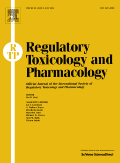
REGULATORY TOXICOLOGY AND PHARMACOLOGY
Pioneering Research for Safer Therapeutics and EnvironmentsREGULATORY TOXICOLOGY AND PHARMACOLOGY is a prestigious peer-reviewed journal published by Academic Press Inc. Elsevier Science, dedicated to advancing knowledge in the fields of toxicology and pharmacology. With an esteemed impact factor and a current ranking of Q2 in both Medicine and Toxicology, this journal serves as a critical resource for researchers, professionals, and students interested in the regulatory aspects of drug safety and environmental toxicology. The journal publishes original research articles, reviews, and regulatory updates that reflect the latest insights and methodologies in safety assessment and toxicological research. Established in 1970, the journal continues to play an integral role in shaping the scientific discourse around regulatory practices in pharmacology, ensuring that both academic and practical perspectives are captured. Readers can access the articles through subscription services, allowing them to stay informed of the most significant developments in the field.

ARCHIVES OF TOXICOLOGY
Leading the Charge in Toxicology InnovationARCHIVES OF TOXICOLOGY is a prestigious journal published by Springer Heidelberg, dedicated to advancing research in the field of toxicology and related disciplines. With a distinguished history dating back to 1930, this journal has continuously provided vital insights and groundbreaking studies, making it a cornerstone in the areas of health, toxicology, and medicine. Recognized for its high impact, it occupies a top-ranking position in Scopus, with remarkable quartile placements in 2023, categorizing it as Q1 in Health, Toxicology and Mutagenesis, and Q1 in Medicine (Miscellaneous). The journal highlights critical research and innovative methodologies, appealing to a diverse audience of researchers, professionals, and students committed to understanding the complexities of toxic substances and their implications for public health and environmental safety. The journal does not currently offer open access, allowing for a more traditional but rigorous peer-review process that ensures the quality and integrity of every published article. Join the global discourse in toxicological science with ARCHIVES OF TOXICOLOGY, where every contribution furthers the understanding of safety and toxicity in our world.

TOXICOLOGY AND APPLIED PHARMACOLOGY
Elevating Understanding in Toxicology and Applied PharmacologyTOXICOLOGY AND APPLIED PHARMACOLOGY, published by Academic Press, Inc. Elsevier Science, stands as a leading journal in the domains of toxicology and pharmacology, with its establishment dating back to 1959. With an impact factor reflecting its academic rigor and relevance, this journal is classified in the Q2 quartile for both pharmacology and toxicology categories, underscoring its significance in the scientific community. It ranks #34 out of 133 in Toxicology and #95 out of 313 in Pharmacology according to Scopus, placing it within the 74th and 69th percentiles, respectively. The journal aims to disseminate quality research that drives advancements in understanding the interactions of drugs and toxic substances within biological systems. Researchers and professionals are invited to contribute and engage with a broad spectrum of articles that cover mechanistic studies, risk assessment, and innovative therapeutic strategies. Although the journal does not offer open access, it continues to be a crucial resource for those who seek to navigate the complex interface of drugs and their toxicological implications.

Exposure and Health
Pioneering insights into toxicology and its effects on health.Exposure and Health is a pioneering journal published by Springer, specializing in the interdisciplinary fields of health, toxicology, and environmental sciences. With an ISSN of 2451-9766 and E-ISSN of 2451-9685, this open-access journal exemplifies a commitment to disseminating high-quality research that informs public health practices and policies globally. Situated in the Netherlands, it boasts an impressive impact factor and ranks in the top quartile (Q1) across multiple categories in the 2023 Scopus rankings, including Health, Toxicology and Mutagenesis, Pollution, and Water Science and Technology. The journal is dedicated to advancing knowledge on the interactions between environmental factors and health outcomes, making it a vital resource for researchers, professionals, and students in these critical fields. Exposure and Health actively encourages submissions that address the challenges of exposure assessment, risk management, and the promotion of sustainable public health initiatives.

JOURNAL OF APPLIED TOXICOLOGY
Exploring the Impact of Chemicals on LifeJOURNAL OF APPLIED TOXICOLOGY, published by Wiley, stands as a leading platform in the field of toxicology, focusing on the rigorous examination of chemical substances and their effects on biological systems. With an impressive Impact Factor, it ranks in the top quartile (Q2) for toxicology journals, reflecting its esteemed position within the scientific community. The journal, identifiable by its ISSN 0260-437X and E-ISSN 1099-1263, has been an invaluable resource since its inception in 1981, and it continues to serve as a conduit for innovative research and practical applications through 2024. Positioned at the forefront of the field, it garners recognition in the Scopus Rankings, where it ranks #31 out of 133 journals in the toxicology category, placing it in the 77th percentile—a testament to its contribution to the advancement of pharmacology and toxicological sciences. While not an open-access journal, it remains accessible to a wide audience of researchers, professionals, and students eager to explore cutting-edge findings in applied toxicology, making it a pivotal resource for enhancing knowledge and fostering collaboration in the field.